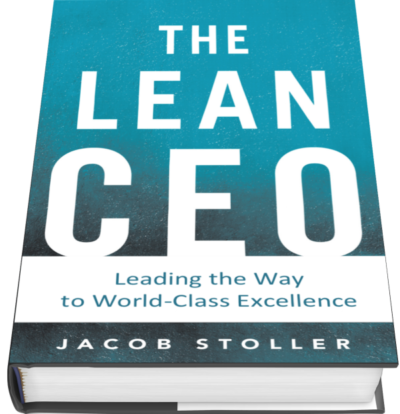A great book by Jacob Stoller , a business and management consultant and speaker, which talks about how many organizations made the transformation to lean as a management system instead of the traditional business models followed everywhere.
The book is a collection of interviews with CEOs who went through that experience, the struggles they faced, and the outcomes and successes they realized.
For me, the book is one of the best if not the best that describes the cultural aspect of lean transformation, in terms of overcoming long standing beliefs, how to bring leadership and front-line on board, and how rapidly Lean thinking spreads once early successes are realized. Such aspect is usually discussed in many books on Lean, but not as vivid as it’s in The Lean CEO.
Lean Transformation is a leadership responsibility
So much has been said about the role of leadership in any cultural change, and specifically in terms of quality improvement. But this book clearly shows real life examples of such role, leaving no doubt about it. Lean transformation is also not for the faint hearted, and the journey can be long, bumpy and could mean walking alone initially. Therefore, strong leaders are the ones who could continue the journey.
All roads lead to Lean
The journey to Lean varies from one place to another, one culture to another, and from a leadership style to another. The book shows the diversity of paths and methodologies the CEOs took to start and achieve Lean transformation. I believe that this is a very important to understand. There is no single recipe to initiate or even practice Lean, so people looking for exact ways to do it may set themselves for failure. However, on the other hand, principles of Lean transformation is almost universal and can be learned from experts.
Learning from others
Lean has started in manufacturing and became crystallized as a management philosophy through Toyota Production System. However, it’s proven now that Lean is applicable to almost every field or industry. CEOs outside manufacturing went to factories to learn the tricks of the trade, Senseis and Lean experts who have worked in different industries were asked to come and help. Successful Lean transformations were accelerated through learning and building on the knowledge of others. I think one of the reasons why some organizations still struggling with Lean is because they either think they could do it alone without the help of others, or they are reluctant to learn from different industries.
The books is a great addition to the Lean body of knowledge, and it doesn’t matter if you are an expert or just a beginner, going through the experiences of those CEOs will help a lot in bridging cultural gaps in any Lean journey. It’s a must read!




